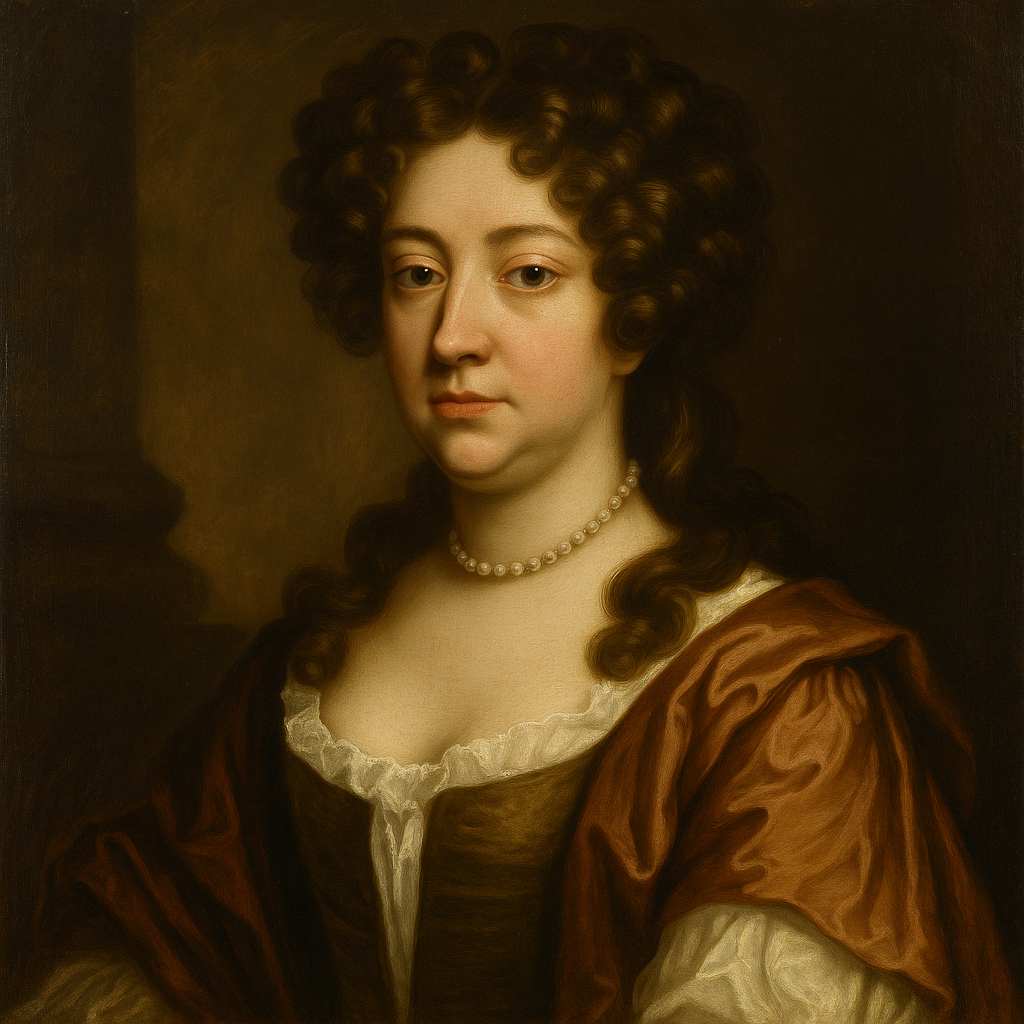Love Armed
Aphra Behn
1640 to 1689

Love in fantastic triumph sat,
Whilst bleeding hearts around him flowed,
For whom fresh pains he did create,
And strange tyrannic power he showed.
From thy bright eyes he took his fires,
Which round about in sport he hurled;
But 'twas from mine he took desires
Enough t' undo the amorous world.
From me he took his sighs and tears,
From thee his pride and cruelty;
From me his languishment and fears,
And every killing dart from thee.
Thus thou and I the god have armed,
And set him up a deity;
But my poor heart alone is harmed,
Whilst thine the victor is, and free.
Aphra Behn's Love Armed
Introduction
Aphra Behn's "Love Armed" stands as a testament to the complex interplay of love, power, and suffering that characterized much of the poetry of the Restoration period. As one of the most prominent female writers of her time, Behn's work often grappled with themes of gender dynamics and the nature of desire, and "Love Armed" is no exception. This essay will delve into the intricate layers of meaning within the poem, exploring its use of imagery, personification, and paradox to create a nuanced portrayal of love's transformative—and often destructive—power.
The Personification of Love
At the heart of "Love Armed" lies a powerful personification of Love itself. Behn presents Love not as an abstract concept, but as an active, even militaristic, force:
"Love in fantastic triumph sat, Whilst bleeding hearts around him flowed,"
This opening couplet immediately establishes Love as a conqueror, seated in "triumph" amidst the carnage of "bleeding hearts." The juxtaposition of "fantastic triumph" with the vivid imagery of bloodshed creates a striking contrast that sets the tone for the entire poem. Love is not merely a gentle emotion, but a force capable of inflicting real harm.
The personification continues throughout the poem, with Love described as creating "fresh pains" and showing "strange tyrannic power." This characterization of Love as a tyrant subverts traditional romantic notions, presenting instead a more complex and potentially dangerous force.
The Paradox of Love's Power
One of the most compelling aspects of "Love Armed" is its exploration of the paradoxical nature of love's power. Behn presents Love as both triumphant and destructive, powerful and dependent. This is particularly evident in the lines:
"From thy bright eyes he took his fires, Which round about in sport he hurled; But 'twas from mine he took desires Enough t' undo the amorous world."
Here, Love's power is shown to be derived from the lovers themselves. The "fires" and "desires" that Love uses as weapons are not inherent to Love, but taken from the eyes and heart of the speaker and her beloved. This creates a complex dynamic where the lovers are both the victims of Love's tyranny and the source of its power.
Furthermore, the poem suggests that Love's power is not uniformly distributed. While both lovers contribute to Love's arsenal, the speaker claims to provide the more potent weapons:
"From me he took his sighs and tears, From thee his pride and cruelty; From me his languishment and fears, And every killing dart from thee."
This stanza not only reinforces the idea of Love's borrowed power but also introduces a gendered element to the distribution of that power. The speaker, presumably female (given Behn's identity), provides the emotional weapons—sighs, tears, languishment, and fears—while her male counterpart contributes pride, cruelty, and "killing dart[s]." This division reflects contemporary gender norms while simultaneously subverting them by suggesting that the feminine contributions are equally, if not more, potent.
The Asymmetry of Love's Effects
Perhaps the most poignant aspect of "Love Armed" is its exploration of the unequal effects of love on the lovers. Despite both contributing to Love's power, the speaker finds herself uniquely vulnerable:
"Thus thou and I the god have armed, And set him up a deity; But my poor heart alone is harmed, Whilst thine the victor is, and free."
This final stanza encapsulates the central tragedy of the poem. Both lovers have participated in empowering Love, elevating it to the status of a deity. However, the consequences of this empowerment are not equally shared. The speaker's heart is "harmed," while her beloved remains "victor" and "free."
This asymmetry adds another layer to the poem's complex treatment of power dynamics in love. It suggests that even when both parties contribute equally to the creation of love's power, they may not be equally affected by it. This unequal vulnerability could be read as a commentary on the broader social and emotional inequities between men and women in Behn's society.
Stylistic and Formal Considerations
From a formal perspective, "Love Armed" demonstrates Behn's mastery of poetic technique. The poem consists of four quatrains with an ABAB rhyme scheme, giving it a musical quality that belies its complex themes. The regular meter (iambic tetrameter) provides a steady rhythm that contrasts with the turbulent emotions described, perhaps reflecting the inexorable march of Love's conquest.
Behn's use of enjambment, particularly in the second and third stanzas, creates a sense of flow that mirrors the movement of Love's borrowed weapons. This technique also allows for subtle emphasis on key words and phrases, enhancing the poem's emotional impact.
The poem's language is rich with imagery and metaphor. The conceit of Love as an armed conqueror is sustained throughout, with vocabulary drawn from the realms of both warfare ("triumph," "tyrannic power," "armed") and romance ("desires," "amorous," "sighs and tears"). This blending of martial and romantic language reinforces the poem's central theme of love as a powerful, potentially destructive force.
Contextualizing "Love Armed" in Behn's Oeuvre and Historical Context
To fully appreciate "Love Armed," it's crucial to consider its place within Behn's broader body of work and the historical context in which it was written. As one of the first professional female writers in English literature, Behn often explored themes of gender, power, and desire in her work. "Love Armed" can be seen as part of this larger project, offering a nuanced and often subversive view of romantic relationships.
The poem's portrayal of love as a potentially harmful force aligns with Behn's often skeptical treatment of romantic conventions in her plays and prose works. However, "Love Armed" goes beyond simple cynicism, offering a complex view of love that acknowledges both its allure and its dangers.
Furthermore, the poem's exploration of power dynamics in love reflects the broader social and political climate of the Restoration period. In an era marked by political upheaval and changing social norms, Behn's portrayal of love as a force capable of both elevation ("set him up a deity") and destruction ("Enough t' undo the amorous world") resonates with the period's broader cultural anxieties.
Conclusion
"Love Armed" stands as a testament to Aphra Behn's poetic skill and her keen insight into the complexities of human relationships. Through its vivid personification of Love, its exploration of power dynamics, and its nuanced treatment of gender roles, the poem offers a multifaceted view of romantic love that continues to resonate with readers today.
Behn's ability to blend conventional romantic imagery with a more skeptical, even militaristic, view of love creates a tension that drives the poem forward. The result is a work that is at once beautiful and unsettling, romantic and cynical. "Love Armed" invites us to consider the power we invest in love, the weapons we provide it, and the unequal wounds it may inflict.
In its exploration of these themes, "Love Armed" transcends its historical context, offering insights into the nature of love and power that remain relevant in our contemporary world. It stands as a powerful reminder of Behn's significant contribution to English literature and her role as a pioneering voice in the exploration of gender and power in poetry.
This text was generated by AI and is for reference only. Learn more
Want to join the discussion? Reopen or create a unique username to comment. No personal details required!



Comments
No comments yet. Be the first to comment!